The Mainstream Phoenix Rises: Samsung's 970 EVO (500GB & 1TB) SSDs Reviewed
by Billy Tallis on April 24, 2018 10:00 AM ESTMixed Random Performance
Our test of mixed random reads and writes covers mixes varying from pure reads to pure writes at 10% increments. Each mix is tested for up to 1 minute or 32GB of data transferred. The test is conducted with a queue depth of 4, and is limited to a 64GB span of the drive. In between each mix, the drive is given idle time of up to one minute so that the overall duty cycle is 50%.
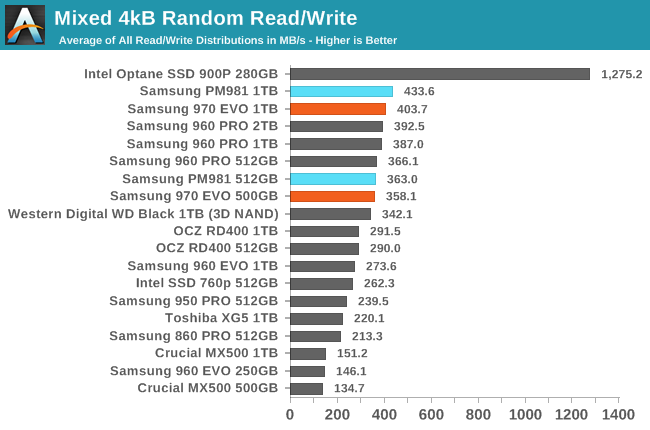
The Samsung 970 EVO is slightly slower than the OEM PM981 on the mixed random I/O test, but that still leaves the 1TB model very near the top of the chart, and the 500GB 970 EVO is only slightly behind the MLC-based 960 PRO.
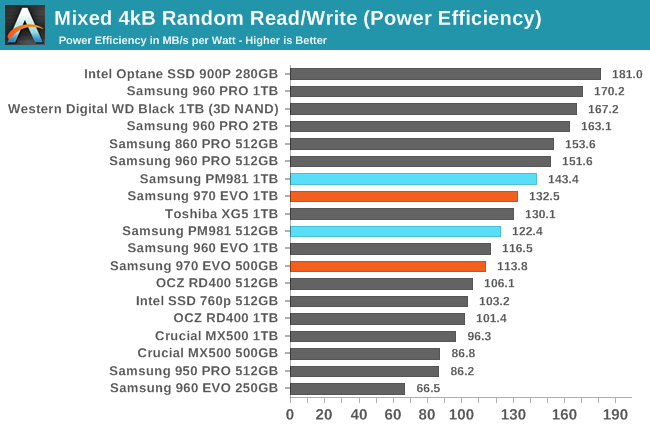 |
|||||||||
| Power Efficiency in MB/s/W | Average Power in W | ||||||||
The power efficiency of the Samsung 970 EVO trails the PM981 by a larger margin than performance alone did. The efficiency of the best MLC drives seems almost out of reach for TLC drives, except that the WD Black is in third place overall with 26% better efficiency than the 970 EVO.
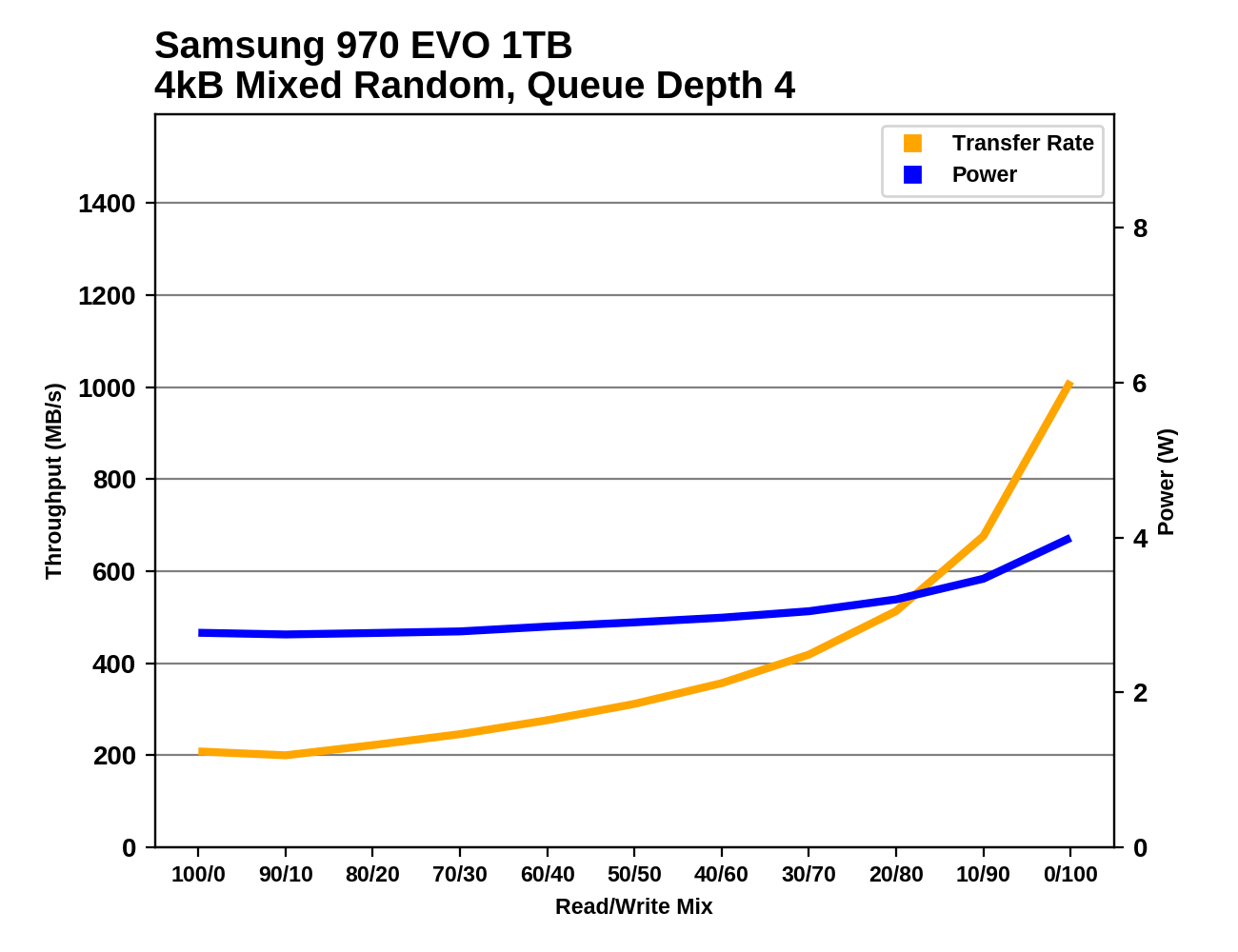 |
|||||||||
The Samsung 970 EVO's performance barely drops when writes are first added to the mix, and it grows at an accelerating rate through the rest of the test. The PM981 pulls ahead in the final phases with higher random write performance than the 970 EVO. The 960 EVO showed very flat performance until fairly late in the test, leaving it well behind the 970 EVO for overall performance despite offering similar performance at either end of the test.
Mixed Sequential Performance
Our test of mixed sequential reads and writes differs from the mixed random I/O test by performing 128kB sequential accesses rather than 4kB accesses at random locations, and the sequential test is conducted at queue depth 1. The range of mixes tested is the same, and the timing and limits on data transfers are also the same as above.
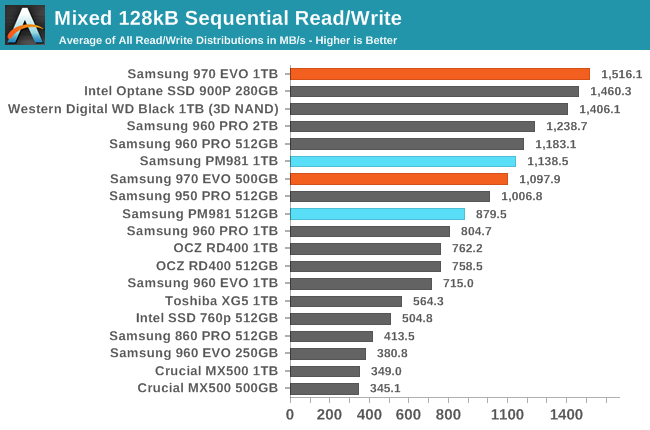
The Samsung 970 EVO sets new records on the mixed sequential I/O test, with the 1TB model beating the Intel Optane SSD and the WD Black. The 500GB model is significantly slower, but still performs well for its capacity. Both models are much faster than the PM981.
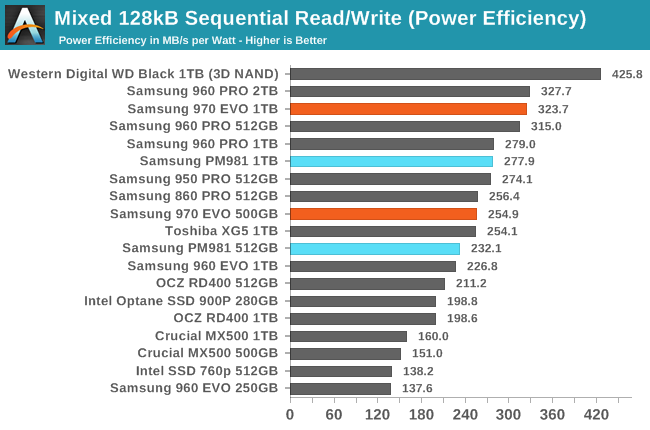 |
|||||||||
| Power Efficiency in MB/s/W | Average Power in W | ||||||||
The 1TB Samsung 970 EVO is essentially tied for second place in power efficiency on the mixed sequential I/O test, but the first place WD Black has a large lead. The improved performance of the 970 EVO over the PM981 is match by improved efficiency, but in absolute terms the 970 EVO is drawing more power than almost any flash-based SSD on this test.
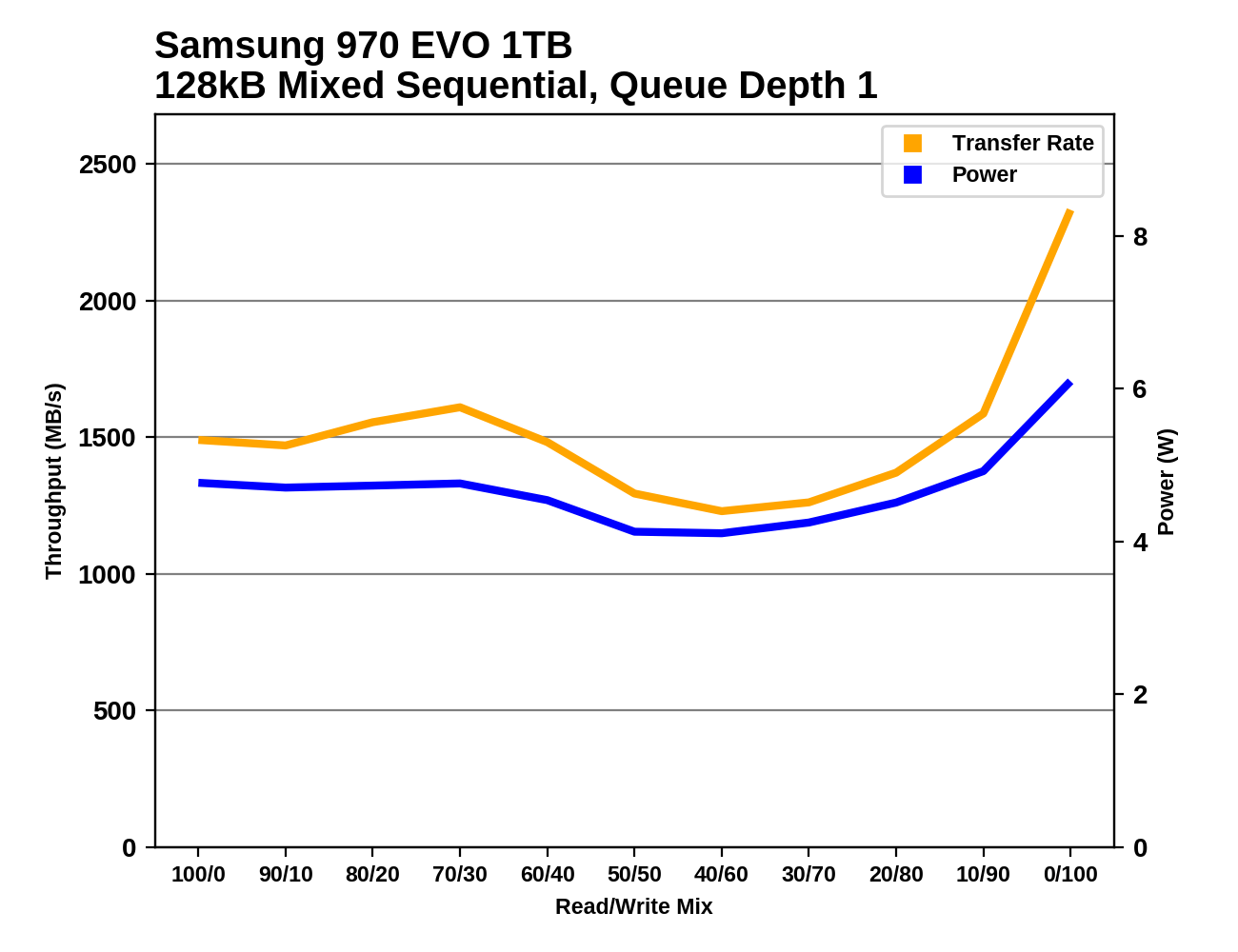 |
|||||||||
The performance of the Samsung 970 EVO on the mixed sequential I/O test wobbles around with an unusual pattern that mirrors that of the PM981 but little else. The 1TB 970 EVO shows the typical spike in performance at the end when the workload shifts to fully cacheable writes, but the test fulls the SLC write cache on the 500GB model and prevents it from getting that boost.










68 Comments
View All Comments
qlum - Tuesday, October 16, 2018 - link
Just as a reminder how the argument against the ssd can change overtime:Right now the prices at least here in the netherlands are as follows:
Crucial MX500 (SATA) €160
HP EX920 (NVMe PCIe x4) €287
Intel 760p (NVMe PCIe x4 ) €289
WD Black (NVMe PCIe x4) €312
Samsung 970 EVO (NVMe PCIe x4) €269
Samsung 960 PRO €374
Suddenly the 970 evo is the cheapest of the bunch this makes its value a lot better
Of course there are still cheaper nvme ssds such as the intel 660p but at the tb mark its one of the cheapest nvme ssd's
modeonoff - Tuesday, April 24, 2018 - link
Isn't nvme m.2 SSD performance affected by Meltdown/Spectre patches?Billy Tallis - Tuesday, April 24, 2018 - link
Yes, because storage benchmarks make system calls more frequently than almost anything else. Once the updates have been applied to the testbed, I'll be re-testing everything for future reviews. This will take a while, so I've waited until I have several reviews worth of testing completed that can fill the gap before I have new results for a new drive and the older drives it needs to be compared against.My preliminary tests of the impact of the patches show that while the scores themselves are affected, the rankings of drives aren't, so the current measurements are still useful for judging which drives are best.
Reppiks - Tuesday, April 24, 2018 - link
Could be nice to see AMD vs Intel post patches as it shouldn't affect AMD as much?Infy2 - Tuesday, April 24, 2018 - link
Nvme and Sata controllers are made by AsMedia on AMD's AM4 mother boards. Sadly they are somewhat slower than Intel's controllers. Even after Spectre and Meltdown patches Intel is still king of storage performance.Tamz_msc - Tuesday, April 24, 2018 - link
Ryzen CPUs have a dedicated PCI-E x4 link for nvme drives which bypasses the chipset.bernstein - Tuesday, April 24, 2018 - link
nvme is just PCIe x4 + software... that's why a passive pcie x4 to m.2 works. and why a nvme m.2 ssd should work with reduced speed over PCIe x1 or PCIe x2. the same goes for PCIe 2.0 links... combine these and you get a working passive mPCIe to M.2 adapter.willis936 - Tuesday, April 24, 2018 - link
NVMe controllers are made by Intel, AMD, and Microsoft (and whatever analog set of companies for mobile) because it's just a software stack that runs on CPUs.Kwarkon - Wednesday, April 25, 2018 - link
Close but not exactly. You mean drivers.HStewart - Tuesday, April 24, 2018 - link
I personally think people are making a bigger deal of this Methdown/Spectre stuff than it worth it.Yes performance is one area - but there are other reasons why people purchase a product.
Especially in heavy graphics or in this case storage usage - these patches should not have no minimal effect.
To the average customer - the effect is not notice - how much will they notice a 5% or leas slow down in cpu speed. But change a hard drive to one of these SSD's would be a significant improvement